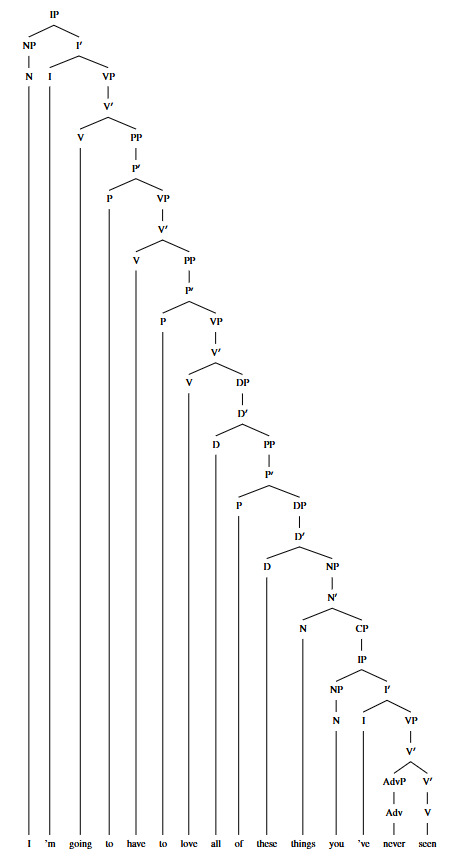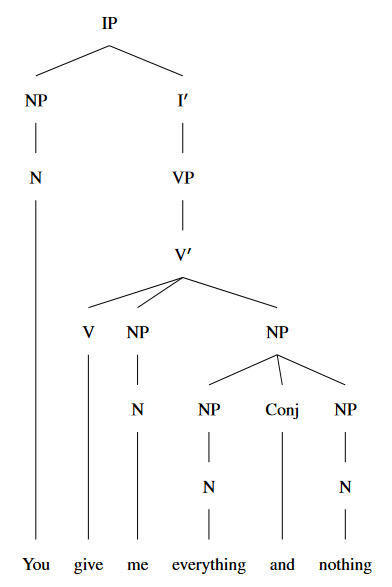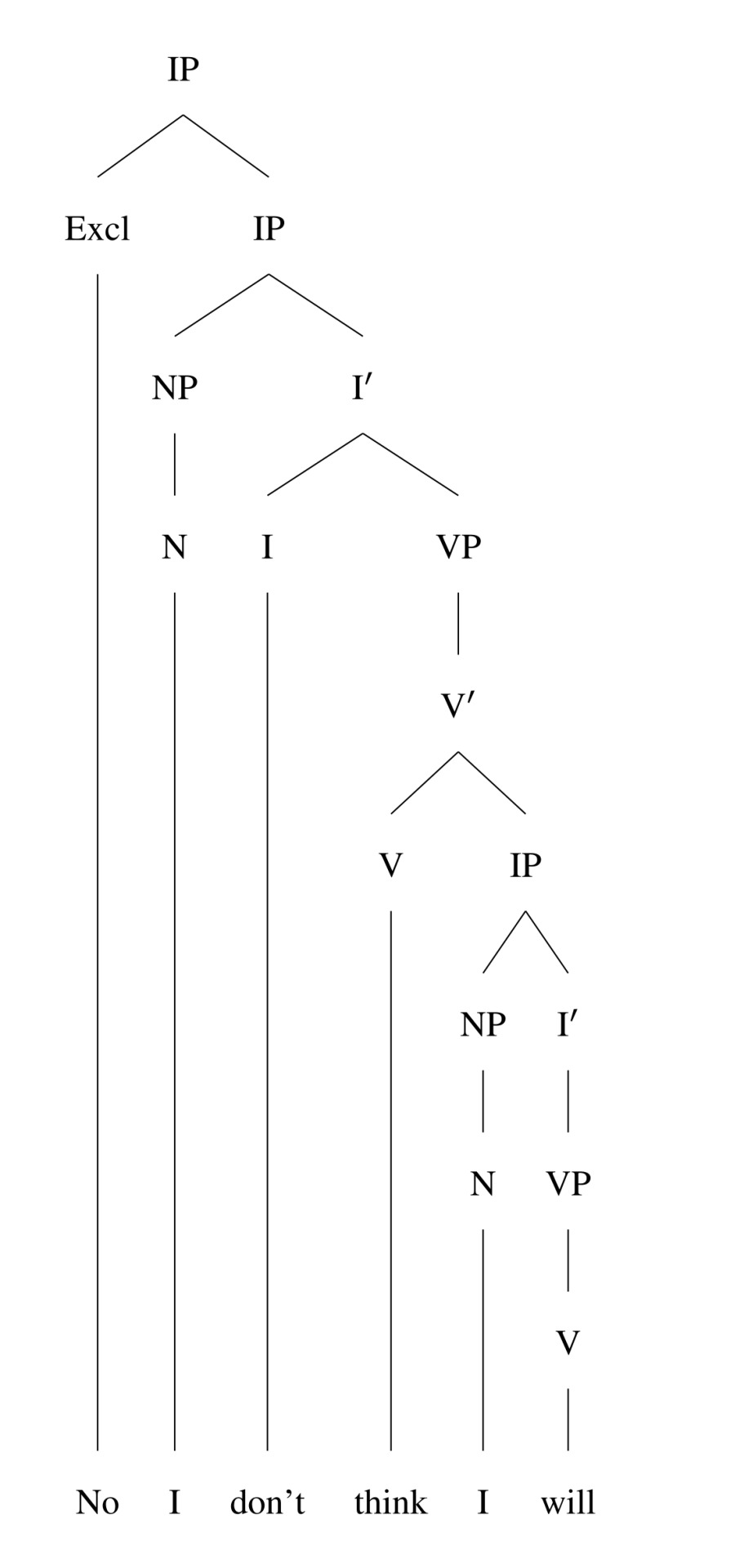I capture wild sentences and seal them in trees | any/all pronouns | main: @melancholia-ennui
Don't wanna be here? Send us removal request.
Note
I'm curious about the sentence "I'm going to have to love all of these things you've never seen". I have studied many things adjacent to linguistics but never linguistics so I find this blog fascinating!!

[ID: Syntax tree for the sentence, "I'm going to have to love all of these things you've never seen". The phrase "all of these things you've never seen" is interpretted as a series of DPs, with "all" as the head of the entire phrase. The tree gives off a sense of mild discomfort at this fact.]
Hello and welcome! Always exicting when someone new is dipping their toes into linguistics - it's a rich and fascinating field, and I would heartily encourage you to follow that fascination!
This tree actually caused me quite a bit of trouble, and I am honestly not 100% sold on the final version. My natural intuition is that "things" should be the head of the object NP, but then the quantifier "all of these" becomes very difficult to express neatly, so in this case I caved and did a DP analysis.
20 notes
·
View notes
Note
Hi, arborist. Can you turn the following Taylor Swift lyrics intro trees?
"You give me everything and nothing" (I wish you would, 1989)
"This love is alive back from the death" (This love, 1989)
"I know you heard about me" (Blank space, 1989)

[ID: Syntax tree for the sentence "you give me everything and nothing". V' directly dominates both object NPs ("me" and "everything and nothing").]
You could have the second object as adjunction of Ns or N's instead of NPs but as the clause itself gives no preference to any of these I opted to prefer adjoining the highest possible node coherent with the observed syntactic properties of the clause.

[ID: Syntax tree for the sentence "I know you heard about me". It is a very long tree, with an IP as the object of 'know' and a PP as obejct to 'heard'.]
Bit of a controversial choice here whether "know" can directly dominate an IP or whether we need some sort of unpronounced intervening CP but in this case I believe the IP analysis is justified by the absence of any content in any CP position.
The third one is actually two clauses, and so it would be two different trees, rather than a single tree. I suppose you could analyse it as adjunction of IPs without a conjunction but like, why would you?
2 notes
·
View notes
Note
how can you be like "I don't use TPs" when you use IPs? I thought they were two names for the same thing???
LFG (excepting LrFG) is a lexicalist theory (that's the "Lexical" part of Lexical-Functional Grammar), which means it assumes that the syntax can't "see inside" a word - that's morphology's business. The terminal nodes of trees are words, and, generally, every word must exist in the p(honological)-string, i.e. no unpronounced "empty" nodes. As such, a node that's just a tense like [past] is inadmissible in a tree in (traditional) LFG.
Where IPs are used in LFG it is either because (1) they are required because some word fills the I head (e.g. tense auxiliaries in English and Warlpiri, verbs in Russian, etc.) or (2) they are required by other phrase structural constraints (e.g. because Subjects in English are usually spec-IP which gives an IP with no head I). Note that (2) is actually highly controversial within LFG - I tend to allow headless IPs to ensure consistency across main verbs regardless of the presence or absence of a tensed auxiliary but other proponents of LFG argue you should never have an IP unless there's some word in I to project it.
By contrast, my understanding is that TP is primarily projected by invisible sublexical grammatical properties that G&B/Minimalist theories assume exist as pseudo-lexical atoms in the clause, in particular tenses, which may or may not be associated with some lexical element that's actually there.
You could just use TP as your term of choice instead of IP for an LFG analysis - I have talked on this blog before about how "IP" itself doesn't really make much sense as a term for that phrasal structure in LFG and is mostly a hold over from previous theories - but to me, at least, if I see TP in a tree I'm going to immediately read that as implying certain (anti-lexicalist) assumptions, so I would be surprised to find an analysis that used TP as its symbol but still required that T always have an overt word as its terminal node.
When I say "I don't use TP..." I mean "my phrase structure does not allow verbal morphology to separate from the verb or project a separate phrase from the verb itself"
3 notes
·
View notes
Note
hey, sorry to bother you, but I just want to know if this is how one would correctly construct a syntax tree of this sentence? (I rarely do syntax trees and merely wanted to construct this one because of an inside joke)

I don't personally use TP (the empirical arguments for it are weak and the analytical arguments only hold water if you assume movement, which I do not), but setting aside that as a matter of analytical preference the only issue I can see here is the N' into N' into wedge over "syntax tree" - if you're going to abbreviate with a wedge anyway, I would tend to do that at the heighest node that dominates all and only the terminal nodes you are abbreviating over.
3 notes
·
View notes
Note
How do you create syntax trees with the word 'why'? I have yet to find any examples online or in textbooks that contain the word 'why'. I'm trying to create a tree for a sentence like "Why won't this ___ love ___?". Sorry if this is a dumb question.
Not a dumb question at all - and, in fact, a rather interesting one!
As an initial caveat, my answer - like everything I do on this blog - will adopt a Lexical-Functional Grammar (LFG) framework, so the answer you get here may look quite different to what you're used to if you come from a G&B / Minimalist background. In particular, I'm going to pretty closely follow the treatment by Dalrymple, Lowe & Mycock (2019, see esp. ch. 3), so if you want more references and discussion, that's the place to go.
The short answer is that, in English, wh-question phrases typically occupy the specifier position of a CP projected above the main clausal IP.
So for example, a sentence of the form "Why is David eating a burrito at the funeral?" would look something like:

[ID: A syntax tree for the sentence "Why is David eating a burrito at the funeral?" "Why" heads an AdvP in the specifier of a CP, of which the fronted auxiliary "is" is the head C. The remainder of the sentence falls under the clausal IP.]
As you can see in the example above, the fronted auxiliary occupies C, projects the CP of which the wh-phrase is the specifier, and takes the clausal IP as its complement.
Hope this helps!
1 note
·
View note
Note
I wonder, will you make trees of other languages?
我今天早上五点半起床了,超市以后里去。 我要了买西红柿,但是售货员说了一个西红柿都没有。糟糕!
I would love to - however, to make an accurate tree requires a minimum familiarity with the syntactic rules of the language in question, and so I would only be confident treeing languages I've studied.
I leave this tree as an exercise for my followers!
5 notes
·
View notes
Note


I tried to tree the titular chorus of The Fine Print by The Stupendium, did I get it right? (Second image is same tree but in wing form for potentially easier tracking)
It's not really about getting it "right" when it comes to trees - what the "right" tree is will depend upon both (1) your analysis of the structure of the sentence itself, and (2) your wider theoretical and formal commitments. E.g., this is definitely "wrong" for a Minimalist tree, but then Minimalism is wrong as a theory, so that doesn't matter all that much.
In terms of the sorts of assumptions I usually make on this blog, this looks like a sound and robust analysis!
14 notes
·
View notes
Note
Hey, I don't usually ask stuff on tumblr but... What does the "I" in "IP" stand for? (I'm sorry if my sentence is grammatically incorrect as English is not my first language )
So the long and the short of it is that in non-derivational theories it doesn't really stand for anything much anymore - sort of.
Historically, "I" stood for "Inflection", with IP being the Inflectional Phrase. This is because, in certain early movement-based theories of syntax, the inflected part of an inflected verb moved to I.
These days, most mainstream syntactic theories hold by some form of the lexicalist hypothesis* (i.e. syntactic rules can't "see inside" words and operate on their constituent components), so you generally don't posit just the inflection of a verb appearing anywhere alone in the structure. However, the IP is still where "inflected material" tends to appear - in English, it's where inflected auxiliaries go (mostly); in Russian, it's where the main inflected verb goes; in Warlpiri, it's where the inflected auxiliary goes; etc.
TL;DR - it stands for "Inflection", but really means "inflected verbal material".
* The exception here is Distributed Morphology and the various frameworks derived from it, such as LrFG. I personally find these frameworks silly and implausible - there is a reason the field of morphology pretty much entirely ditched morphemes a decade or two ago now - but they do exist and are gaining traction in some parts of the field, so I guess I am obliged by academic integrity to at least mention them.
9 notes
·
View notes
Note
Why do you say that minimalism is wrong as a theory? Genuinely curious
OK, so to be perfectly honest this is mostly in jest - Minimalists have a bit of a reputation within linguistics for treating the assumptions of their framework as Universal Truths(TM) which understandably grates with linguists who reject those assumptions, resulting in what might be called a friendly rivalry.
There is not, to my knowledge, any piece of evidence that categorically disproves the core assumptions of Minimalist - but that is, in part, because Minimalism in its current form is unfalsifiable.
Consider flat syntactic structures, for example - say the post-auxiliary field in Warlpiri or Jiwarli, or even the Mittelfeld of a German sentence. You can interpret these through a framework that posits a universal hierarchical structure in language, but only by positing some kind of post-construction "scrambling", which makes the original hierarchical claims unfalsifiable. (If it's always possible that speakers can just move components around post-construction, then there is no longer any requirement for the surface form to reflect the supposedly "underlying" construction in any systematic way, and so you can posit anything you need to in that construction to guarantee the predictions of your theory - hence, unfalsifiable.) I also find "scrambling" to be inherently implausible as a theory of human cognition, but that's a separate issue.
So given it's inherent unfalsifiability, the question of yes or no Minimalism is ultimately one of a balance of plausibility - is this particular framework more plausible than the alternatives? But that is, in turn, a somewhat subjective question. What theoretical virtues do you consider important, and which less so? What forms of parsimony do you favour? What evidence do you consider, and what interpretative frameworks do you apply to that evidence (e.g. is the question "can Minimalism explain this evidence", or "can another theory explain this evidence better")?
For example, psychological plausibility is a pretty key criterion for linguistic theory selection in my opinion, as I believe our goal should be to model language qua a human behaviour that exists in a psychosocial context, and there are lost of psychologically implausible components of standard Minimalist analyses (such as scrambling, traces, etc.). If, however, you don't care about psychological plausibility because you are only interested in modelling language qua a formal system isolated and seperated from any actual human activity, then this sort of argument wouldn't hold any weight.
Or we could think about parsimony. Minimalism is called "minimalism" because it strives for a particular kind of parsimony - namely, a parsimony of operations (ideally reduced to just one or two syntactic operations). But this parsimony of operations results in incredibly bloated structures, a proliferation of categories, and a very computationally complex derivational process. By contrast, something like Lexical-Functional Grammar (LFG) has highly parsimonious construction and much simpler structures than a Minimalist analysis, and thus is more minimal than Minimalism in these respects, but at the cost of having many more rules of construction. Which form of parsimony you prefer will depend on both your other theoretical commitments, and your own theoretical preferences and assumptions.
Ultimately, we need to remember that linguistics is still a very young science, very much in its infancy, and we know much less than we think we do about language - like early chemists who tried to understand all chemical reactions in terms of a handful of base metals, or physicists trying to understand combustion in terms of phlogiston. Likely none of our present linguistic theories will ultimately stand the test of time, at least not without serious revision.
(E.g. some of my own research presents a serious challenge to the core LFG assumptions about grammatical functions, so in a sense I would also argue that LFG is "wrong" as a theory in its standard formulations - just less wrong than Minimalism, in my opinion.)
So calling Minimalism "wrong" as a theory was mostly hyperboly and a bit of a joke. Well, it is strictly wrong in the scientific antirealist sense, but in that sense no more so than any other framework. But I do find it a highly implausible theory, one which continues a particular analytical tradition which we as a scientific community should really have outgrown by now. The description of languages like Warlpiri and Jiwarli should have been the death-knell for derivationalist syntax, and the fact they have not suggests a theoretical conservativism which is only going to hinder the development of linguistics into a mature science.
19 notes
·
View notes
Note
your blog is so awesome :) everyone i know thinks linguistics are boring so it's really nice to see someone who treats it as a complex and interesting field- which it is!
I'm glad you like it! I found linguistics complex and interesting enough to get two degrees in it (three when I finish my doctorate) so I should say you'll only find love (and occasional frustration) for it here!
25 notes
·
View notes
Note
sorry I can’t type apparently
can you do “this is not a syntax tree” now? T

[ID: A syntax tree for the sentence "this is not a syntax tree". The "not" is represented as the head of a NegP, with the NP "a syntax tree" appearing in a headless VP.]
24 notes
·
View notes
Note
What is
[vp [np [noun]] [v' [verb] [adjp [adjective]]]]?
Is it a syntax tree? If so, for what sentenve??
It is a reference to @sentence-structurer's blog title, which this blog was largely inspired by. It's a bracket notation tree of what that blog's title would be, if it were analysed in a tree structure instead of in a sequence of grammatical role labels. Well, if we ignore a bunch of details like IPs, because that would've made the title for this blog so needlessly long and messy as to be entirely uninterpretable.
6 notes
·
View notes
Note
What is is?
(request+question)
"is" is a copula verb - its only real function is to maintain a verb-centric clause structure, which is part of why so many languages (and, for that matter, varieties of English) do without one.

[ID: A small syntax tree for the sentence "what is 'is'?". The second "is" is introduced as a non-projecting verb subcategorised as the object of the first "is".]
8 notes
·
View notes
Note


I tried to tree the titular chorus of The Fine Print by The Stupendium, did I get it right? (Second image is same tree but in wing form for potentially easier tracking)
It's not really about getting it "right" when it comes to trees - what the "right" tree is will depend upon both (1) your analysis of the structure of the sentence itself, and (2) your wider theoretical and formal commitments. E.g., this is definitely "wrong" for a Minimalist tree, but then Minimalism is wrong as a theory, so that doesn't matter all that much.
In terms of the sorts of assumptions I usually make on this blog, this looks like a sound and robust analysis!
14 notes
·
View notes
Note
my parrot ate my pet rat and said that it was delicious

[ID: Syntax tree for the sentence "my parrot ate my pet rat and said that it was delicious".]
12 notes
·
View notes
Note
hello! Please consider responding to this ask and then making a syntax tree of your response!

[ID: Syntax tree for the sentence "No, I don't think I will".]
8 notes
·
View notes
Note
learning more about syntax trees from your blog than I did in my damn intro course
Just wait till I have time to start doing proper theory posts!
#but seriously thank you#I'm glad this silly little project is helpful#i just want to share the joy these silly little graphs bring me#asks#meta#not a tree
5 notes
·
View notes